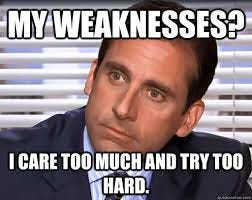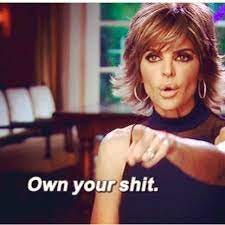Do I need to be good at everything?
Nope. Own your weaknesses.
Hi all!
I am struggling this week with the social media algorithm gods that be. Over the weekend, Instagram deleted my @thetowoolist account with no warning or rationale. It’s since been reinstated (still with no rationale)… but it was pretty alarming. The idea of needing to recreate content or re-recruit followers was pretty daunting (and baffling, it’s such a benign account).
Turns out, managing social media is not an insignificant amount of work! (especially if you are an old like me ;))
Anyway. Onto this week’s newsletter!
Musings
Traditionally, talking about our weaknesses in a career sense was considered taboo. For instance, the cringeworthy answer that people tell you to give in a job interview when asked “What’s your greatest weakness?”:
Sometimes, social media, and the pervasive hustle culture we live in makes it feel like we need to be good at everything. We only show the world heavily curated versions of ourselves, and when we only see the slices of other people’s lives that embody ‘hustling’ and ‘crushing it’, it’s common to feel totally inadequate if we are not excellent at everything. I see it (and live it) especially for women. In every part of our lives, not just work. There are optimized ideals of so many versions of #goals out there (#fitnessgoals, #couplegoals, #mommygoals, #bossgoals). There’s so much focus on achievement, that it’s hard not to feel overwhelmed and even ashamed by our ‘weaknesses’, or areas that we’re not measuring up.
But I really think there’s an authenticity and vulnerability that comes with highlighting our weaknesses. There’s something powerful about casting light on what you are not great at . Aka:
It takes away the power for someone else to call it out. It removes the shame from it. And acknowledging where we aren’t fully developed is a starting point in an action plan to develop it.
I once worked with a very well-respected Chief Investment Officer, who made investment decisions on behalf of billions of dollars and millions of pensioners. I helped him raise his first independent fund and the first thing he admitted to me was
“I’m not a salesperson at all. I’ll do my job and make great investment decisions, but I’m bad at selling and I don’t want to do it. Your job will be to do most of the storytelling and relationship building.”
It struck me how someone with his fantastic reputation was so open about a known weakness. It certainly takes a bit of confidence (and yes, privilege), to open with what you’re not good at, but in some ways, his unabashed admission was deeply impressive.
Conversely, when I was in investment banking and sales and trading, I always worried that I was a “B minus finance person”. I constantly worried that I’d be “found out”, and I always viewed the skillset of building relationships and explaining concepts as an “inferior” skillset to the actual skill of financial modelling. Years later, when I was hired to work in this fundraising role, someone ended up placing value on the exact skills that came naturally to me.
It felt like such a relief to not have to be something I wasn’t.
Here’s a simple framework to think about your strengths and weaknesses.
On the axes:
Skill: how good or experienced are you at this thing?
Will: how much do you want to do this, is it a good use of your time? Do you want to acquire this skill? Will you enjoy doing so? Is it valuable?
The Quadrants
High skill + high will = Your Niche. Own it. You thrive here. Find more opportunities that let you do these things.
High skill + low will = Delegate. You can do it, but you don’t really want to anymore. Give it to someone you trust to do it well. Usually, in order to know who and how to delegate to, you need to have done it well yourself first
Low skill + high will = Upskill. You haven’t had the opportunity to do it yet, but you’re keenly interested. Maybe you have a hunch you’d be good at it. Close the gap (identify what you need - e.g. manager training, training in a specific software, public speaking training)
Low skill + low will = Hire someone to complement you or change the situation. If you hate it and you’re bad at it, you might not need to force yourself to do it. Maybe you can hire someone whose niche lands right in this quadrant (see the CIO anecdote above), maybe you can find a role or job that doesn’t require this skill
It’s certainly a bit of a simplification, and it’s not always feasible to enact - we can’t delegate all of the things we don’t want to do, but it’s a framework to remember that:
We don’t need to be equally great at everything: We can invest more or less in different quadrants
Where we’re at in these quadrants at any given time is fluid: Our interest and aptitude changes over time. Which quadrant we’re in at a given time isn’t a “final destination”
We only grow when we we put ourselves in the low skill quadrants: there is nowhere to go from Quadrant 1. There are many more possibilities to grow from when we try new things, or navigate uncomfortable situations
*Important caveat here: Early on in your career, you definitely need to at least try to be good at everything. You are a sponge at that stage, and you should soak up as much foundational information, and as many best practices as possible. But as you move up, you can earn the right to not be good at every single thing.
Conversations
There are three different women in my network that all started in investment banking and consulting, and journeyed into senior investor roles, through a few different paths. At one point or another in their careers, they all struggled with feeling like they were ‘bad at investing’. None of them felt like quantitative analytical work was squarely in their ‘niche’ quadrant which led to feeling 1) inadequate and also 2) ashamed, like they needed to cover it up, adding a second level of stress. Who can relate to that dogpile of negative feelings? Me! me! me! If this resonates with you, feel free to share this post:
As a starting point, it is empowering simply to admit “this doesn’t feel easy or natural to me”, just to remove that layer of shame.
Each of them had different reasons for feeling this way, and ended up taking different paths to end up in the roles that they ultimately did. Three women, same perceived weakness, three similar-seeming destinations, three very different paths.
One struggled in Quadrant 2:
She was an investor at a VC firm and had certainly had the analytical skill set from a decade in consulting, but her “will” was motivated by the wrong things.
She constantly felt like she needed to own all of the analysis and modeling to prove herself internally to other partners and externally to other investors. Doing the analysis was adding to her plate in a way that made her feel stressed out.
Her true niche was meeting tons of founders and companies, and building an ecosystem, which in venture capital, can actually be more valuable than any financial analysis: Building relationships can lead to differentiated deal sourcing, and many of the companies at an early stage barely had tangible financial metrics on which to base analysis. She perceived the number crunching as being more credible - and she had this feeling that she needed to work hard and suffer to really earn recognition
She came to recognize that it was ok to be recognized for her natural strengths. The most impactful thing she could do was delegate the analytical work, and be comfortable doing so. She could still ‘prove’ her analytical chops by overseeing and checking the analysis, but she didn’t need to do it all herself
Another struggled in Quadrant 4:
She had years of consumer brand operating experience under her belt and a passion for companies in that space
She joined a private equity fund, and it immediately felt like a less than ideal fit - the rigidity of the process and the requirements for detailed financial modelling was not her cup of tea. The process didn’t value her strengths: intuition about companies’ brands and go to market strategies
She could improve on the process if she spent hours tweaking and finessing spreadsheets, but most of the time it felt incredibly stressful
Ultimately, she made the decision to pivot to an fund with an incubator model that focused on earlier stage consumer companies. Her intuition around brands and her operational acumen helped create businesses from scratch, and was valued so much more than running numbers
Being confident enough to own that spreadsheet jockeying was not her strength, (nor did she want it to be), empowered her to seek out a different type of investor/builder role that allowed her strengths to flourish, vs. forcing her to build a skillset she didn’t really want. (for more on quitting when you feel like there’s a misalignment what you and your company values, check out here)
Finally, the third struggled in Quadrant 3:
She had years of experience as a consultant and investment banker at the analyst/associate level. She was evaluating the career choice of either going down an investment path or a strategy path at a large private equity firm
She knew that the investment path would be more challenging and less congruous with her existing skillset. In addition to financial modelling, she would also be measured on managing transactions and deal sourcing
However, her “will” was sky high, and deeply intrinsic. She was incredibly motivated by a mission: wanting to have more women in investment roles. She wanted to really move the needle on diversity and inclusion - not just increasing the number of women at the firm, but increasing the number of women who made investment decisions at the firm
She recognized that would only come by more experience/exposure, and threw herself headfirst into the valuation work and transaction experience that would enable her to upskill
The thing about investing (and this is a proxy for other career experiences), is that no one actually starts off being amazing at it. Owning where we need to learn or change, and critically examining if we want to invest energy is incredibly valuable.
Resources/Links:
The New York Times wrote this piece on “Hustle Culture” which describes how “performative workaholism” makes people miserable
“How to Delegate and Get More Done” : step one.. learn to let go.
“Hiring People with Complementary Skills”: Generally, you don’t want to hire your clone. Find people that complement you. Step one here is honestly assess your strengths and weaknesses
Cool ladies doing cool things: There is a lot of blockchain in the news lately, but this story is incredible for its potential impact on an entire nation - “Meet the woman behind Cambodia’s Moonshot Blockchain Project”. Serey Chea is an Assistant Governor at National Bank of Cambodia, working on a “backbone payments system” that could set up modern financial services infrastructure to improve lives in the developing world.
Tell Me About You
What’s one thing you are unabashedly bad at?
Has ‘admitting’ that you’re not good at something landed you in a better, more suitable role down the road? Or caused you to supplement around you with an impactful hire?






